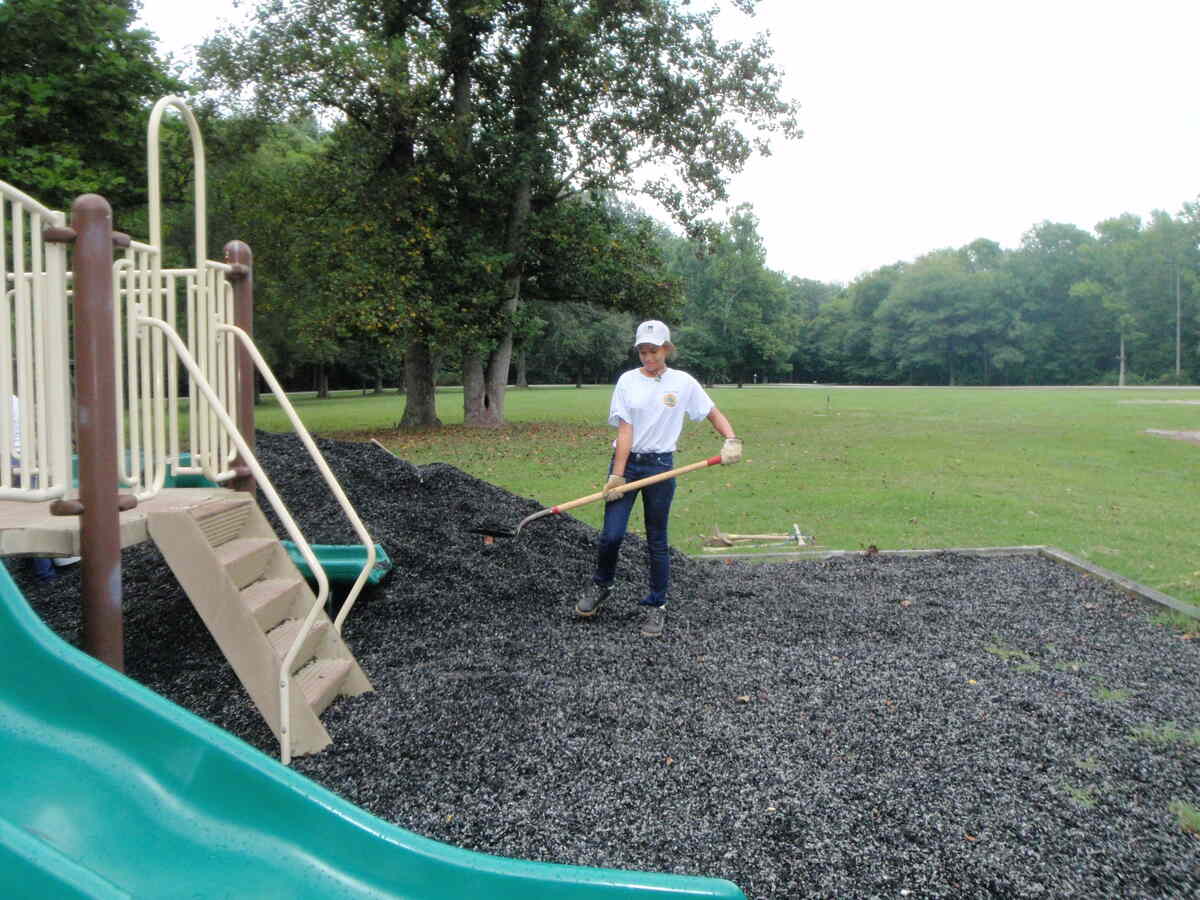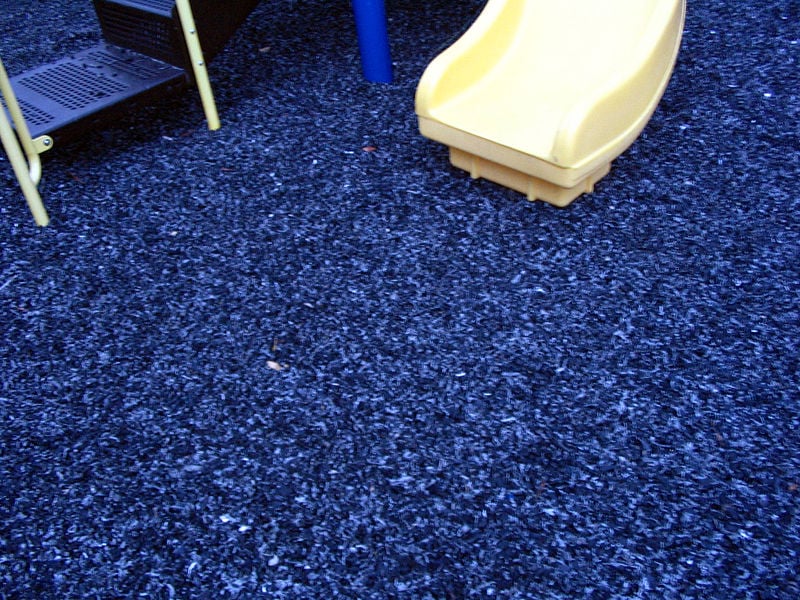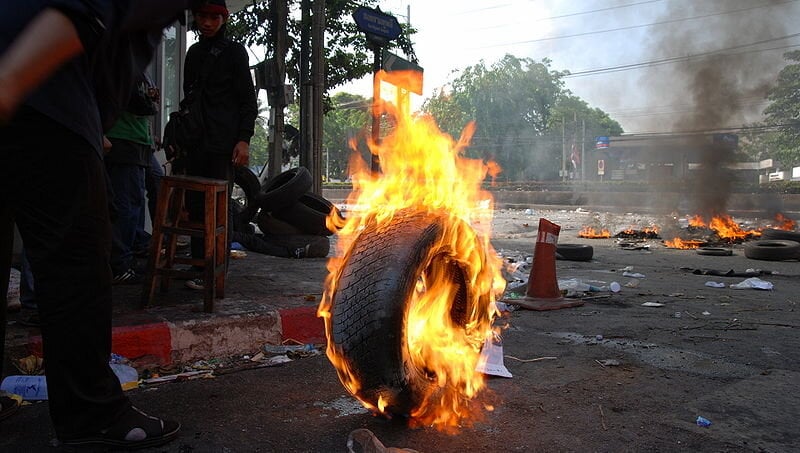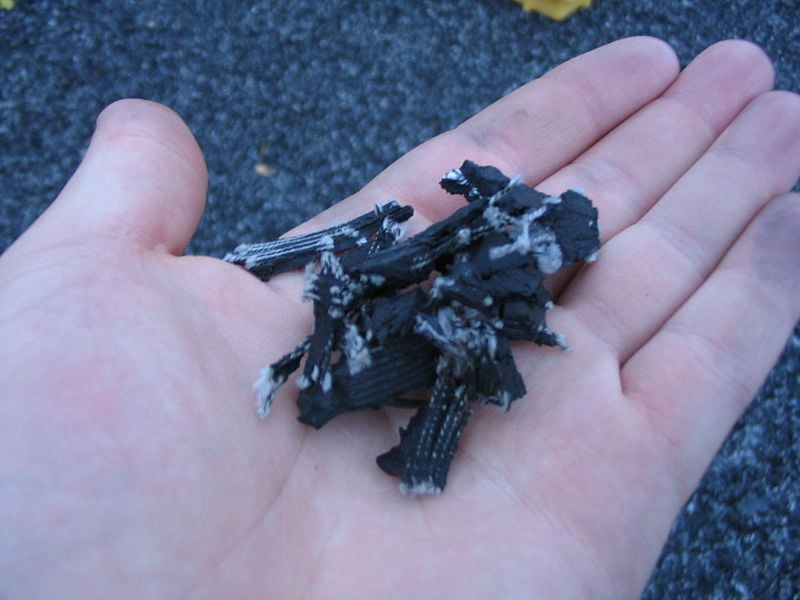
Rubber mulch is long-lasting and can be a safer surface for your child’s backyard playground, but recycled tire chunks have drawbacks, too. For example, tire mulch is flammable and may be toxic. In this article, we’ll explore the pros and cons of rubber mulch in your landscaping.
What is Rubber Mulch?
According to the Environmental Protection Agency (EPA), we currently discard around 290 million scrap tires annually. As a way to resolve this excess waste, shredded rubber tires are now sought after to use as mulch in home landscaping, at playgrounds, and as crumb rubber in turf sports fields.
And because most mulch is made of organic material, some refer to rubber mulch as “artificial mulch” or “fake mulch”, since it is made of recycled tire rubber, an inorganic material. Despite its popularity, many parents, gardeners, athletes, and professionals are starting to raise questions about the toxicity and health risks of rubberized mulch.
So let’s go through the pros and cons of rubber mulch so you can make the best decision for your home and landscaping.
Pros of Rubber Mulch
The advantages of rubber mulch are many, including its low maintenance needs, slow decay, and replicated wood mulch texture. Rubber mulch is used in landscapes, sports fields, and playgrounds and offers many benefits.
Permanence
Using rubber mulch has a huge upside: Because of its material, it decomposes slowly. While mulches made of organic materials, like traditional wood mulch, decompose into the soil and need routine replacement, shredded tire mulch lasts much longer.
But how long does rubber mulch last? Rubber mulch lasts an impressive 10 to 20 years. It only needs replacement more often if it’s scattered or if the color fades.
Practicality
Rubber mulches are widely available, easy to spread, come in a variety of colors, and don’t need regular replacement. It’s hard to say no to a mulch that requires little maintenance and still adds a pop of texture and color to your flower beds.
Recycled Material Utilization
Because of the high number of scrap tires thrown away each year, shredded tires have become a desirable product to help manage this excess waste and provide an eco-friendly solution that recycles rubber.
Weed Suppression
Like many mulches, both inorganic and organic, rubber mulches suppress weed growth by blocking the necessary light and space weed seeds need to grow. Many use rubber mulch in flower beds for that reason.
Wind Resistance
Heavy rain and wind will have trouble displacing this mulch. While leaves and sawdust can make excellent organic mulches, it’s easy for them to get blown out of place. You won’t have this happen with rubber mulch.
Pest Resistance
Another advantage of rubber mulch is that it is not attractive to common outdoor pests like carpenter ants and termites. Many opt for rubber landscaping mulch in landscape beds, for example, because it will limit the number of pests near your home and help reduce the use of pesticides in your landscaping project.

Safe Fall Surface
When children are running around on playgrounds, they’re bound to tumble from playground equipment and scuff up their knees. Rubber mulch can make safer play area surfaces that soften their falls and help prevent painful playground-related injuries.
Artificial Turf Support
Tire crumbs are poured between artificial grass blades to give artificial turf fields more cushion, support, and traction.
Cons of Rubber Mulch
Now that we’ve walked you through the many benefits of rubber mulch, you might be wondering: But what are the disadvantages of rubber mulch? Though rubber mulch may have its benefits, its downsides have alarmed parents who take their children to playgrounds.
Amongst the other rubber mulch problems, its toxicity potential has raised concerns for Linda Chalker-Scott, Ph.D., Extension horticulturist and associate professor at Washington State University. Her work covers the potential myth behind rubber mulch that says it’s an environmentally-friendly, non-toxic mulch.
Below are the disadvantages of rubber mulch and fears shared by people like Chalker-Scott and concerned parents:
It Doesn’t Add Nutrients to the Soil
One of the most significant rubber mulch cons is that it does not decompose and therefore does not enhance the soil’s nutrient levels. And that’s one of the biggest differences between mulch made of organic matter and artificial mulch.
Organic mulches (bark mulch and grass clippings, for example) are plant-based materials, and therefore decompose and add nutrients to the soil, while synthetic mulch does not.

It’s Highly Flammable
One of the biggest cons of rubber mulch is that it’s a fire hazard. According to a landscape rubber mulch combustibility study conducted by the University of Nevada Cooperative Extension, shredded rubber produced the highest results in all three combustion characteristics among eight different mulches. These characteristic measurements included:
- Average maximum flame height
- Average fire spread rate
- Average maximum temperature measured at 4 inches above the bed
It’s Not Really Permanent
Some microbes can break down the rubber, Chalker-Scott says. Yet while tire additives are toxic to the rubber-degrading bacteria, she reports that some white-rot and brown-rot fungal species can detoxify these additives and allow the bacteria to decompose the rubber.
Because these additives are needed to prevent bacteria from deteriorating the tires, she argues they falsify the assumption that rubber mulch is “permanent.” She also puts into question whether car tires can introduce these toxic additives into the landscape.
It’s Toxic
Tire wear particles might negatively impact small organisms in water habitats, Alison J. Draper, an assistant professor of chemistry at Bucknell University, found. Her studies involved contaminating clean samples of water with finely ground tire particles.
After 10 days of contamination, she filtered out the particles to create leachate that contained any remaining rubber tire substance. According to her findings, all organisms exposed to the leachate died.
Chalker-Scott warns against rubber garden mulch because of its high levels of zinc toxicity, which can kill plants. She writes that rubber leachate has a mineral content of:
- Aluminum
- Cadmium
- Chromium
- Copper
- Iron
- Magnesium
- Manganese
- Molybdenum
- Selenium
- Sulfur
- Zinc
It’s a Potential Hazard to Athletes
According to the Minnesota Department of Health, athletes on synthetic turf fields with tire crumb rubber infill can potentially be exposed to harmful chemicals (metals such as zinc and lead) while breathing, having skin contact, or ingesting the material.
Athletes who come into close contact with turf fields, like goalkeepers, may be at higher risk. After soccer goalkeepers began suffering from cancer, soccer coach Amy Griffin compiled a list of 38 American soccer players (34 of them goalies) who have been diagnosed with cancer.
Its Safety for Children is Debated
Is rubber mulch good for children’s play areas? That’s the million-dollar question, and it seems the jury is still out. In its Public Playground Safety Handbook, the Consumer Product Safety Commission recommends using rubber mulch on playgrounds to cushion children’s falls.
However, in an interview with NBC Nightly News, Dr. Philip Landrigan, dean of global health at New York’s Mt. Sinai Hospital, expressed his concerns about young children having cumulative exposure to the toxic chemicals in shredded tires.
Where Can You Get Rubber Mulch?
Rubber mulch is widely available online and in stores. The cost of rubber mulch is relatively expensive compared to other popular mulches, such as wood chips, compost, or leaves, which can cost as little as $0. But is rubber mulch worth it?
While the initial rubber mulch cost might seem a hefty sum, homeowners may find the investment worthwhile since it doesn’t need to be replaced for many years. Rubber mulch is also available in various colors, including blue, green, brown, black, and red.
FAQ About Rubber Mulch
Does Rubber Mulch Stain Clothes?
A good quality rubber mulch shouldn’t stain clothes and should easily come off the skin.
How Long Does the Mulch’s Color Last?
The color of your rubber mulch will depend on the brand you buy. Many rubber mulch companies guarantee up to 12 years of color before fading.
Are There Wires in Rubber Mulch?
There can be. Because rubber mulch is made from recycled tires, it may contain pieces of exposed wire. To reduce the amount of wire in rubber mulch, manufacturers use magnetic equipment to remove the wire.
Keep in mind that these magnets may not extract all the wire from the mulch, though the chance of rubber mulch harboring the remaining wire remains small.
Is Recycled Rubber Mulch Accessible for Those With Disabilities?
The Americans with Disabilities Act (ADA) requires all commercial facilities to be readily accessible and usable by individuals with disabilities. All rubber mulch used on playgrounds must be ADA-compliant.

Is Rubber Mulch the Right Choice for You?
Recycled tire mulch is popular for reusing old tires that would otherwise be in a landfill. It offers a long-term solution to mulching, effectively controls pests, and helps protect children from serious injury on the playground. However, the use of rubber mulch is a controversial subject.
The heavy metals it contains and the potential for them to leak into the environment still have many parents and professionals concerned for plants, athletes, and young children’s health. You might be wondering: If it’s toxic, why use rubber mulch at all? In the end, the best mulch for you will depend on your goals and the type of project you are aiming for.
If you already have the material at hand and are wondering what you can do with it, rest assured that rubber mulch landscaping is possible. Rubber mulch can be a good substitute for traditional hardscaping materials like concrete or pavers. Here are some rubber mulch landscaping ideas:
- Create a simple rubber mulch patio.
- Build an easy-to-make rubber mulch pathway.
- Fill slopes with a rubber mulch landscape incline.
When to Call a Landscaping Pro
Call a landscape professional near you if you need assistance selecting, hauling, spreading, or even removing mulch. A professional can also help you choose the right mulch options for your landscape by conducting soil tests and assessing your plants’ and soil’s needs. There are many different types of mulch that you can choose from, each with an individual set of pros and cons.
Main Image Credit: VSPYCC / Flickr / CC BY 2.0